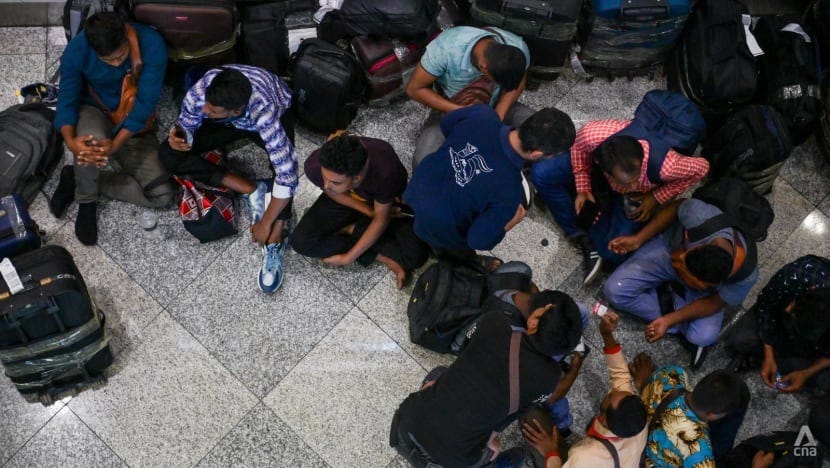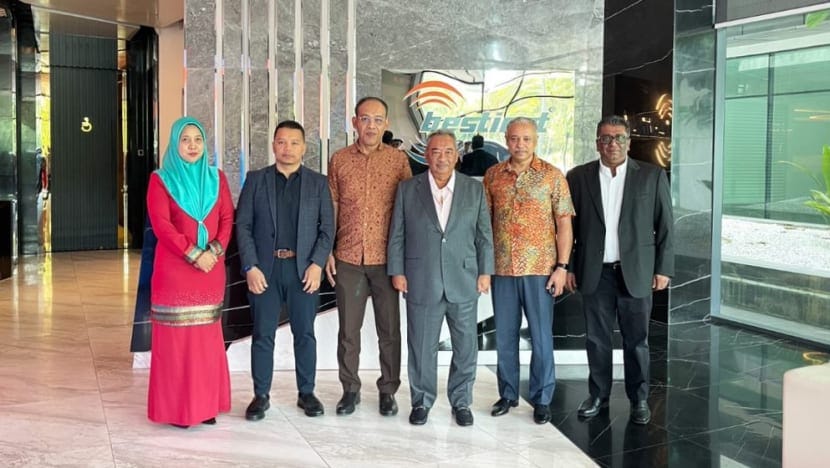
Murray Hunter
CNA: Controversial firm managing Malaysia's migrant worker intake set to renew contract for 3 years under strict terms
Amid intense behind-the-scenes lobbying, Prime Minister Anwar Ibrahim’s government is set to allow Bestinet Sdn Bhd to continue operating the IT platform that manages the intake of migrant labour into
JUN 24, 2024

Malaysia's migrant labour recruitment system, particularly for workers from Bangladesh, is under international scrutiny. (Photo: CNA/Fadza Ishak)
By Leslie Lopez
KUALA LUMPUR: Bestinet Sdn Bhd, a private entity with political clout that has long had a stranglehold over Malaysia’s migrant labour recruitment system, is set to get a fresh three-year contract to manage the country’s foreign workforce intake, government sources say.
The new contract heads off the Home Ministry’s plan – reported last month by CNA – to replace Bestinet’s proprietary IT system that manages the intake of migrant workers by Malaysia, and spotlights hurdles in the economic reform agenda of Prime Minister Anwar Ibrahim’s administration.
The proposed new arrangement will come with strict conditions for the company, sources say, setting the stage for more behind-the-scenes political manoeuvring between the government and the powerful Bestinet lobby.
According to sources, the company would be required to surrender control of its payment systems under the firm’s proprietary IT system, the Foreign Workers Centralised Management System (FWCMS).
Bestinet was informed last week of the new conditions by the Home Ministry, which supervises the migrant labour recruitment system together with the Human Resources Ministry. The last FWCMS contract with the government expired at the end of May.
Only after the company accepts the new terms will a fresh three-year arrangement be finalised, the government officials said.
SWIFT CODE HANDOVER
One key element in the proposed contract extension is that Bestinet must hand over to the government its so-called Swift code, alphanumeric ciphers used by banks globally for the international transfer of funds, and other protocols in the payment system that the company employs in the processing of migrant workers into Malaysia, the administration sources said.
Kuala Lumpur would then make payment to Bestinet for its services.
A Bestinet company executive declined to discuss queries from CNA. The spokesperson noted that the government of Malaysia “would make any necessary announcement, if any”.
Home Minister Saifuddin Nasution Ismail, who is personally overseeing the Bestinet issue, did not respond to queries from CNA about the planned three-year extension to the company under the new conditions.
But local and foreign labour activists noted that Bestinet has already signalled news about its continued role to recruitment agents in countries such as Nepal, Myanmar and India, asking them to update their licences before mid-June with their respective governments to qualify as employment representatives under Malaysia’s FWCMS platform.
CNA has reviewed these email notifications.
“That Bestinet has received an extension is not (a) secret in the (migrant labour) market and it is disappointing because the country is being held to ransom by continuing with the company’s platform,” noted Mr Charles Santiago, a former elected Member of Parliament who is part of a government-private sector working committee involved in bringing change to the country’s migrant labour recruitment system.
Bestinet’s FWCMS concession, which is the sole platform used by the country’s Immigration Department for visa applications from 15 countries exporting labour to Malaysia since 2013, has long attracted domestic and international scorn over allegations of rampant corruption and the exploitation of impoverished overseas recruits.
As reported earlier by CNA, the Malaysian government had planned to replace the 11-year concession with a new IT portal that has been under development for the past year that government proponents noted would make the process of foreign labour recruitment cheaper, more transparent and minimise third-party involvement.
But that plan faced serious pushback.
Bestinet’s top management, including its founder Mohamed Amin Abdul Nor, and labour agents aligned with the company put pressure on the Anwar government by tapping their connections with Malaysia’s political elite and segments of the country’s royal households to secure a fresh multi-year extension for its FWCMS concession.
Bestinet's founder Mohd Amin Abdul Nor stepped down as chairman in July 2023. Chief executive officer Ismail Mohd Noor is third from left. (Photo: Facebook/ Bestinet Sdn Bhd)
Political operatives in Mr Anwar’s inner circle acknowledged that the premier and the Home Ministry had come under intense lobbying.
The big test facing the government now is whether Bestinet will accept the new terms under the proposed three-year extension or once again turn to its politically powerful patrons to pile pressure on Mr Anwar’s administration and further undermine the government’s economic reforms, noted labour activists.
Government officials declined to discuss the new conditions over the payment protocols and the demand for Bestinet to surrender the Swift code.
Labour activists speculated that the move could be aimed at dealing with the widespread problems associated with the recruitment of workers from Bangladesh, which is one of Malaysia’s main sources of foreign labour.
The official fee for a single Bangladeshi recruit is roughly RM4,500 (US$955) but, in reality, each migrant worker pays nearly four times that amount to a cast of players in a convoluted recruitment process that also involves forcing employers to pay hidden fees for each worker.
Political operatives in Mr Anwar’s inner circle acknowledged that the premier and the Home Ministry had come under intense lobbying.
The big test facing the government now is whether Bestinet will accept the new terms under the proposed three-year extension or once again turn to its politically powerful patrons to pile pressure on Mr Anwar’s administration and further undermine the government’s economic reforms, noted labour activists.
Government officials declined to discuss the new conditions over the payment protocols and the demand for Bestinet to surrender the Swift code.
Labour activists speculated that the move could be aimed at dealing with the widespread problems associated with the recruitment of workers from Bangladesh, which is one of Malaysia’s main sources of foreign labour.
The official fee for a single Bangladeshi recruit is roughly RM4,500 (US$955) but, in reality, each migrant worker pays nearly four times that amount to a cast of players in a convoluted recruitment process that also involves forcing employers to pay hidden fees for each worker.
MESSY POLITICS
Before assuming the premiership after an inconclusive general election in November 2022, Mr Anwar and his coalition partners in the Pakatan Harapan (PH) alliance had been hugely critical of Bestinet’s stranglehold on migrant labour intake, which was granted by the previous government led by now-jailed former premier Najib Razak.
But pushing through reforms has been an uphill struggle for Mr Anwar because of Malaysia’s messy politics.
Mr Anwar was forced to forge an alliance with the United Malays National Organisation (UMNO) and other unlikely political bedfellows to form a unity government and become premier.
While the ruling alliance, headed by PH together with other regional parties in the east Malaysian states of Sabah and Sarawak, enjoys a solid majority in the 222-member parliament, relations between the component parties remain testy and tenuous, forcing the premier to often make compromises that trump the reform platform.
“The country is being held hostage by the players in the foreign labour recruitment system and unless the government gets tough, (Mr Anwar’s) reforms will go nowhere,” said Mr Santiago.
Mr Santiago noted that Malaysia's reliance on foreign labour, together with groups of undocumented migrants who sneak into the country through its porous borders with the help of human trafficking syndicates, has created other distortions to the economy.
For one, the large presence of a cheap foreign labour force has allowed the private sector to keep a lid on wages, which in turn has hurt many ordinary Malaysians in the lower income brackets.
“Putting food on the table is a fundamental issue for many ordinary Malaysians and a political problem for the government. The only way is to deal with the migrant labour problem decisively,” said Mr Santiago.
POSSIBLE DOWNGRADE
According to official statistics, documented migrant workers make up about 15 per cent of Malaysia’s workforce and many work in so-called 3D – dirty, dangerous and demeaning – jobs that are usually shunned by locals.
Combined with undocumented workers, their numbers could be around 5.5 million based on unofficial estimates.
The migrant labour ecosystem has also blighted Malaysia’s international standing due to collusion among politicians, the country’s entrenched and powerful civil service, enforcement agencies, recruitment companies, labour brokers and exploitative employers.
This has resulted in Malaysia being listed with the likes of China and North Korea for its poor progress in eliminating human trafficking by the United States State Department, which is set to release its annual Trafficking in Persons (TIP) Report today (Jun 24).
The TIP Report is a closely tracked assessment that evaluates global trafficking trends and focuses on government efforts in prosecution, protection and prevention.
Malaysia is currently ranked on Tier 2 in the US TIP Report, but Mr Andy Hall, a Nepal-based labour activist who has done extensive work on the migrant labour situation in Malaysia, noted that its situation is precarious.
“Malaysia's systemic inability to meaningfully combat labour trafficking, ensure remediation of victims and accountability of perpetrators warrants its immediate downgrade to Tier 3 in the upcoming 2024 US Department of State TIP Report,” he said in a statement to CNA.
Malaysia was downgraded to Tier 3 in 2021 and 2022, a period that saw five companies being slapped with export bans to the US.

A company with Bestinet's record of impropriety ( fact) or even illegality (alleged) should not have had its contract renewed.
ReplyDeleteThe credible threat of loss future opportunities must be there as a deterrent against unethical or even illegal actions.